- Home
- Dan Abnett
[Gaunt's Ghosts 12] - Blood Pact Page 7
[Gaunt's Ghosts 12] - Blood Pact Read online
Page 7
“Yes.”
“And that mission was?”
“A security mission.”
Edur looked up at Gaunt and smiled as if expecting more.
“And classified,” said Gaunt.
Edur pursed his lips and raised his eyebrows. “Your command was restored on your return?”
“It wasn’t quite as clear-cut as that, but yes.”
“You’re a colonel-commissar?”
“Yes.”
“Split rank. That’s unusual.”
“It is what it is.”
Edur fixed Gaunt with an amused look again. “Did you take the Commissariat’s ‘Advanced Interview Techniques and Methodology’ class?”
“Is that one of your questions?” asked Gaunt.
Edur shook his head, still amused by something. “No, I just thought I’d ask. I’ve seen less deflection in a sword fight.” He looked back at the dossier, and turned another page.
“The Tanith First was retired from the front line two years ago?”
“Yes.”
“And you transitted here to Balhaut for resupply and retraining?”
“Yes.”
“You’ve been here a year?”
“Yes.”
“How are you finding it?”
“Dull,” said Gaunt.
“Why?”
“People keep telling me things I already know.”
Edur laughed. “I’m just asking what they’ve told me to ask, Gaunt. It’s a pain in the arse, I know.”
“Well, let’s get to the part where you tell me why they’ve told you to ask me these questions.”
Edur nodded. “We will. You’ve been here a year? Yes, we established that. Anything odd to report in that time?”
Gaunt sat back. “What sort of odd?”
Edur shrugged. “Odd approaches? Odd contacts? Anybody shadowing you or hanging around Aarlem?”
Gaunt shook his head.
“Note head-shake,” Edur told the steno. “Nothing strange at all, then? In the last month especially?”
“No,” said Gaunt. “One way or another, there’s a whole bundle of odd in the Tanith First, but nothing I’m not familiar with.”
Edur pursed his lips again and nodded. “All right, Gaunt, here’s what it is. We’ve got a prisoner here. A significant capture, very sensitive. There’s some talk he should have just been executed, but Section believes there’s a potential high value to his intelligence, so they’ve kept him alive. He’s downstairs.”
“What’s this got to do with me?”
“We need to get inside his head, and find out what he’s got.”
“I understand that,” said Gaunt, “but again, what’s this got to do with me?”
“The prisoner clearly appreciates that the remaining duration of his life, and the comparative quality of that life, will rather depend on how he gives up his secrets. He knows that he will be disposed of the moment we feel he’s exhausted his usefulness.”
“So he’s not talking?”
“No, he’s not,” said Edur.
“Did you bring me down here just so I could suggest you employ methods of persuasion?”
“No,” Edur replied. “We’d already thought of that, funnily enough. He’s quite resistant to pain. Our thinking was, we’d try a different approach. Offer him something he wants in return for his submission.”
“I see. At the risk of sounding like a vox stuck on auto-send, what’s this got to do with me?”
“Everything, Gaunt,” said Edur. “He wants you.”
SEVEN
Prisoner B
An armoured elevator took them down into the detention level. The cell-block area, heavily guarded, was tiled in white stone, and felt more like the surgical zone of a medicae facility than a prison. Edur took Gaunt to an observation room that looked into a simple tank cell through a murky one-way mirror.
When the sanctioned torturers, their sackcloth hoods tucked into their belts for the time being, led the prisoner into the cell, caged phosphor lights flickered on, and bathed the cell in a sick, green glare. The torturers, burly men with bitter faces, strapped the prisoner onto the single cage chair screwed to the deck in the centre of the cell floor.
“I don’t know him,” said Gaunt.
The prisoner was a soldier. Gaunt could tell that from a glance. It wasn’t so much the size of him, which was considerable and heavily muscled, it was his bearing. He was straight-backed and upright. He was somehow noble. He was underweight, and he had evidently suffered physical abuse, but he was not cowed. He held himself the way a soldier holds himself.
The prisoner was dressed in a simple prison-issue tunic and breeches, and he had been given hessian slippers to cover his feet.
“Are you sure?” asked Edur.
“I don’t know him,” Gaunt repeated.
“Please, make certain.”
“Edur, don’t be an idiot. I’d remember a face like that.”
The prisoner’s face and head were not noble. The scalp was shaved, and the flesh was covered with deep ritual scars, old scars, scars that signified the most mortal and bloody pact.
“He asked for you by name,” said Edur. “He has made it clear that he will speak only to you.”
“How does he know me?” asked Gaunt. “How does he know I’m here, on this world?”
Edur shrugged. Gaunt could see that Edur was watching him for telltale body language, any little slip or give-away. He also knew that just as they were watching the prisoner in the cell, they were in turn being watched.
“You’re desperate to unlock him,” Gaunt observed to Edur, “and I’m the best hope you’ve got, but you don’t trust me either.”
“This is a complicated matter,” Edur replied, his genial tone unable to mask his tension. “It’s very sensitive. Objections were raised at the idea of bringing anyone else in. Your clearance is not as high as they would have liked.”
“My clearance levels have been pitiful since I came back from the Gereon mission,” replied Gaunt. “I imagine your colleagues have reviewed that, and they’ll have read the dossiers compiled on me by Commissar-General Balshin, Commissar Faragut, and a number of other individuals, including a servant of the holy ordos.”
“I think they probably have,” agreed Edur.
“I imagine they don’t present me as an attractive participant in this business, which is why you’ve spent the last week or two vetting me, and why they’re watching us now.”
Gaunt looked up at the ceiling, and ran his gaze along the walls.
“But, for all that, the Gereon mission is precisely why I’m here, isn’t it?” he asked.
Edur nodded.
“This man is connected to Gereon?”
“Specifically, your mission there,” said Edur.
Gaunt paused and looked back at the prisoner in the cell. The man wasn’t moving. He was just staring blankly at the mirror wall.
“He has told us that his name is Mabbon Etogaur,” said Edur.
“Well, that’s not strictly accurate,” said Gaunt.
“What do you mean?”
“Mabbon may be his name, though I doubt it’s his given one. It’s probably a saint name he adopted when he took his pact.”
“A saint name?” asked Edur.
“They have saints too, Edur,” replied Gaunt. He looked at the prisoner again. “Etogaur isn’t a name. It’s his rank. He gave you his name and rank. An etogaur is roughly the equivalent of a general.”
“I see.”
“It’s a senior rank in the army of the Blood Pact.”
“Anything else?” asked Edur.
Gaunt nodded. “Yes. For all that, he’s not Blood Pact.”
“He isn’t?”
“The ritual scarring on the face and the scalp, those are pact-marks, definitely, but look at his hands.”
They looked through the mirror wall. The prisoner’s forearms were buckled to the arms of the cage chair. His hands were resting, limp and open, against the ends of the
chair-arms.
“I don’t see anything,” said Edur.
“Exactly.”
Edur glanced sideways at Gaunt. “If you know something, say it.”
“There are no scars on his hands,” said Gaunt, still staring at the silent prisoner. “None on the backs, none on the palms. Of all the pact-marks, the hand scars are the most significant. When a warrior of the Blood Pact makes his oath, he slices the palms of his hand against the sharpened edges of his heathen master’s armour. That solemnises the pact. That is the pact. This man has no scars.”
“No, he doesn’t,” said Edur.
Gaunt narrowed his eyes to peer harder. “It’s hard to tell in this light, but the flesh of his hands looks new. It’s unblemished. A little smooth. I can’t be sure, but I’d wager he’s had grafting done to conceal or remove the rite scars. The chances are, this man was Blood Pact, but he isn’t anymore.”
“So you suppose he has renounced his pact?”
“Quite possibly. He’s a man of significance in their world, and he’s gone to a lot of trouble and expense to have those grafts to erase his scars. It’s quite a statement.”
“Could he not just be concealing what he really is?”
Gaunt shook his head. “This isn’t about concealment. He’d have had the rite scars on his head done, otherwise. They show his connection to the Sanguinary Worlds clearly enough. No, the hands are telling. He’s not hiding his scars, he’s deleting them. He’s actively rejecting the pact.”
“What does that make him?”
“It could make him any number of things, Edur, but at the very least it makes him a traitor. A traitor general.”
“Interesting,” said Edur.
“Not really. You know all of this already,” Gaunt replied.
Edur raised his eyebrows. “What makes you say that?”
“Oh, come on, commissar,” Gaunt sighed. “The idea that you, and our invisible handlers, and the whole of Section’s intelligence division hadn’t already worked all of that out is frankly insulting. We’ve been studying the Pact for years. This was all about you finding out how much I know.”
Edur smiled and raised his hands submissively. “Fair play, Gaunt. You can’t blame us.”
“So how did I do?” asked Gaunt.
“Not bad at all. What else can you tell me?”
Gaunt took a deep breath and looked back at the prisoner. “The key thing, I suppose, is that he’s changed sides. That’s a huge psychological marker. He is capable of being sworn to something, to be absolutely committed to it, and then to switch away and renounce it. If he’s done it once, he can do it again. It’s like infidelity.”
Edur chuckled. “What sort of switch are we talking about, do you think?”
Gaunt shrugged. “An awful lot of Blood Pact start out as Imperial Guard or PDF. Most of the time, it’s a ‘join us or die’ dynamic, but sometimes the choice is rather more personal. Like all converts, willing or not, they can often be the most radical, the most zealous. This man may have been Imperial once. Then he took the blood pact. Then he renounced that too. For some reason, he’s serially unfaithful.”
“What do you suppose he is now?” Edur asked.
“It’s just a hunch,” Gaunt replied, “but I think he’s one of the Sons of Sek.”
“Explain your logic,” said Edur.
“The Blood Pact is a warrior cadre sworn to the personal service of the Archon. Magister Sek, called by some the Anarch, is Archon Gaur’s foremost lieutenant. It’s a king and prince dynamic, a father and son thing. Sek is ambitious, and envies the Gaur’s Blood Pact shamelessly. When I was on Gereon, we heard that Sek’s agents had set out to build a Blood Pact of their own, the Sons of Sek. Just as the Blood Pact have stolen bodies from the Imperial Guard over the years, so the Sons have begun to pilfer from the Pact. Officers, particularly, men with experience to help them shape the Sons quickly and robustly. This man says he’s an etogaur, and the Sons have pretty much the same rank system. It’s the best reason I can think of to explain why he still holds the rank, but has erased the scars from his palms.”
Edur smiled and nodded.
“Yes,” he said, “that’s exactly what we thought.”
“Two questions stand, then,” said Gaunt. “What does our etogaur know, and why does he want to talk to me about it?”
“Indeed,” Edur replied.
“So, do you want me to talk to him?” asked Gaunt. “Or am I too great a liability?”
Edur hesitated.
The vox-plate mounted on the tiled wall beside the mirror jangled suddenly. Edur lifted the handset before it could complete its first ring.
“Yes?” he said. Gaunt waited. He could just hear a whisper of voices talking on the other end of the line.
“Very well. Thank you.”
Edur hooked the handset back on its cradle. He looked at Gaunt.
“You can go in,” he said.
EIGHT
Etogaur
“I’m Gaunt.”
The prisoner, clamped into his seat, turned his head to look. He stared at Gaunt for a long while, expressionless. The tank door closed behind Gaunt with an anvil clang. It was airless in the cell.
The prisoner began to speak. His voice sounded dry, almost dusty, as if it had been left neglected and unused for years.
“I never met you,” he said. “On Gereon. I never met you in person. I will need some… verification.”
Prisoner B’s command of Low Gothic was excellent, but he had an accent, an out-worlds accent that put a burr on the words, and made each syllable sound as though it was draped in razor-wire.
Gaunt walked around the cage chair once, and came to a halt facing the prisoner. The prisoner made direct and immediate eye contact without flinching. His eyes seemed to loom at Gaunt in the phosphor-green glow of the tank. Gaunt could see—
Nothing. There was nothing there to see!
Gaunt cleared his throat.
“My unit eliminated the traitor general Noches Sturm at Lectica Bastion,” he said, skidding matter-of-factly through the account as if it was a summary of how he’d spent an idle morning off-duty. “The head-shot that ended him was self-inflicted, a last moment of honour in an otherwise despicable life. Out of respect for that, I covered his face with a cloth from his bed chamber before I left the body. The cloth was green silk.”
The prisoner nodded.
“Now how do you know me?” asked Gaunt. It was still and airless in the tank cell. Gaunt wanted to rap on his side of the one-way mirror and urge Edur to crank up the air-cycling.
“I was a senior officer in the occupation forces of Gereon,” the prisoner replied in that voice of dust and barbed wire. “My remit was to examine Sturm and, by means of interrogation and interview, extract as much useful intelligence from him as I could. After his death, a great effort was made to identify, locate and execute his killers.”
“I remember. I was there,” said Gaunt.
“You were active on Gereon for quite some time after the assassination. You worked with the resistance. You effectively built the resistance from the ground up. Though we never caught you, your name was known to us. The name Gaunt, the names of your elite team… They were notorious.”
“That almost sounds like you’re paying me a compliment,” said Gaunt.
The prisoner shrugged as much as the restraints would allow. “Any soldier who does not respect another soldier’s achievements is a fool.”
“You’re going to quote Slaydo at me now, are you?”
“I’d quote the Archon Gaur, but your ears would bleed.”
Gaunt walked over to the tank door.
“Where are you going?” asked the prisoner.
“I don’t think we’ve got much to talk about,” Gaunt replied.
“We’ve only just begun,” the prisoner said.
Gaunt looked back at him. “The Imperium wastes very little time capturing or interrogating soldiers of the Archenemy. Their corruption is considered to
o pernicious. No intelligence obtained from them can be considered reliable, and there is always the risk of contamination to the interrogators. You should have been executed before now, not preserved in detention.”
“I have managed to convince my captors to allow me to remain alive this long. You are my last chance.”
“Why should I care?”
“For the sake of the Imperium,” said the prisoner.
“Is that something you care about?” Gaunt asked, making no effort to disguise his sarcastic tone.
“I have pretty much ceased to care about anything,” said the prisoner. “But I know you care, and that’s enough. I can help the Imperium, Gaunt, but in order to do that, the Imperium has got to learn to trust me.”
“I don’t think that’s going to happen.”
“I believe you are the one person who can convince them to listen to me.”
“Why?” asked Gaunt.
“You were on Gereon for a year,” said the prisoner. “An occupied world, Gaunt. A tainted world. It doesn’t matter what you did or how bravely you served the Golden Throne, you ought to have been executed on your return. No one lasts that long without falling prey to the taint of Chaos. But you’re alive, and still in service. Somehow, you convinced your masters that you were clean.”
“By the skin of my teeth,” said Gaunt, “and there is still dissent.”
“But you did it. There is no one better equipped to judge me, to estimate how genuine I am, and then convince the powers that be to listen.”
Gaunt shook his head. “I’m not sure I want to do that. I’d be damning myself.”
“If you refuse me, I’ll be dead before the day’s out,” said the prisoner. “I’m an asset, Gaunt, and only you can see it, if you look.”
Gaunt had walked back to the cell door, and was reaching out his hand to bang on it. He hesitated.
“When you say you can help the Imperium, what do you mean?” he asked.
“I mean,” the prisoner replied, “that I can help the Imperium win the war for the Sabbat Worlds.”
NINE
Sweet Tooth
That morning, cold and overcast in the west, the enemy was a slice of almonotte. It had a layer of cream, and another of rotchka, and the soft cake was scented with popoi nuts, and capped with a caul of blue sugar icing.
“And that mission was?”
“A security mission.”
Edur looked up at Gaunt and smiled as if expecting more.
“And classified,” said Gaunt.
Edur pursed his lips and raised his eyebrows. “Your command was restored on your return?”
“It wasn’t quite as clear-cut as that, but yes.”
“You’re a colonel-commissar?”
“Yes.”
“Split rank. That’s unusual.”
“It is what it is.”
Edur fixed Gaunt with an amused look again. “Did you take the Commissariat’s ‘Advanced Interview Techniques and Methodology’ class?”
“Is that one of your questions?” asked Gaunt.
Edur shook his head, still amused by something. “No, I just thought I’d ask. I’ve seen less deflection in a sword fight.” He looked back at the dossier, and turned another page.
“The Tanith First was retired from the front line two years ago?”
“Yes.”
“And you transitted here to Balhaut for resupply and retraining?”
“Yes.”
“You’ve been here a year?”
“Yes.”
“How are you finding it?”
“Dull,” said Gaunt.
“Why?”
“People keep telling me things I already know.”
Edur laughed. “I’m just asking what they’ve told me to ask, Gaunt. It’s a pain in the arse, I know.”
“Well, let’s get to the part where you tell me why they’ve told you to ask me these questions.”
Edur nodded. “We will. You’ve been here a year? Yes, we established that. Anything odd to report in that time?”
Gaunt sat back. “What sort of odd?”
Edur shrugged. “Odd approaches? Odd contacts? Anybody shadowing you or hanging around Aarlem?”
Gaunt shook his head.
“Note head-shake,” Edur told the steno. “Nothing strange at all, then? In the last month especially?”
“No,” said Gaunt. “One way or another, there’s a whole bundle of odd in the Tanith First, but nothing I’m not familiar with.”
Edur pursed his lips again and nodded. “All right, Gaunt, here’s what it is. We’ve got a prisoner here. A significant capture, very sensitive. There’s some talk he should have just been executed, but Section believes there’s a potential high value to his intelligence, so they’ve kept him alive. He’s downstairs.”
“What’s this got to do with me?”
“We need to get inside his head, and find out what he’s got.”
“I understand that,” said Gaunt, “but again, what’s this got to do with me?”
“The prisoner clearly appreciates that the remaining duration of his life, and the comparative quality of that life, will rather depend on how he gives up his secrets. He knows that he will be disposed of the moment we feel he’s exhausted his usefulness.”
“So he’s not talking?”
“No, he’s not,” said Edur.
“Did you bring me down here just so I could suggest you employ methods of persuasion?”
“No,” Edur replied. “We’d already thought of that, funnily enough. He’s quite resistant to pain. Our thinking was, we’d try a different approach. Offer him something he wants in return for his submission.”
“I see. At the risk of sounding like a vox stuck on auto-send, what’s this got to do with me?”
“Everything, Gaunt,” said Edur. “He wants you.”
SEVEN
Prisoner B
An armoured elevator took them down into the detention level. The cell-block area, heavily guarded, was tiled in white stone, and felt more like the surgical zone of a medicae facility than a prison. Edur took Gaunt to an observation room that looked into a simple tank cell through a murky one-way mirror.
When the sanctioned torturers, their sackcloth hoods tucked into their belts for the time being, led the prisoner into the cell, caged phosphor lights flickered on, and bathed the cell in a sick, green glare. The torturers, burly men with bitter faces, strapped the prisoner onto the single cage chair screwed to the deck in the centre of the cell floor.
“I don’t know him,” said Gaunt.
The prisoner was a soldier. Gaunt could tell that from a glance. It wasn’t so much the size of him, which was considerable and heavily muscled, it was his bearing. He was straight-backed and upright. He was somehow noble. He was underweight, and he had evidently suffered physical abuse, but he was not cowed. He held himself the way a soldier holds himself.
The prisoner was dressed in a simple prison-issue tunic and breeches, and he had been given hessian slippers to cover his feet.
“Are you sure?” asked Edur.
“I don’t know him,” Gaunt repeated.
“Please, make certain.”
“Edur, don’t be an idiot. I’d remember a face like that.”
The prisoner’s face and head were not noble. The scalp was shaved, and the flesh was covered with deep ritual scars, old scars, scars that signified the most mortal and bloody pact.
“He asked for you by name,” said Edur. “He has made it clear that he will speak only to you.”
“How does he know me?” asked Gaunt. “How does he know I’m here, on this world?”
Edur shrugged. Gaunt could see that Edur was watching him for telltale body language, any little slip or give-away. He also knew that just as they were watching the prisoner in the cell, they were in turn being watched.
“You’re desperate to unlock him,” Gaunt observed to Edur, “and I’m the best hope you’ve got, but you don’t trust me either.”
“This is a complicated matter,” Edur replied, his genial tone unable to mask his tension. “It’s very sensitive. Objections were raised at the idea of bringing anyone else in. Your clearance is not as high as they would have liked.”
“My clearance levels have been pitiful since I came back from the Gereon mission,” replied Gaunt. “I imagine your colleagues have reviewed that, and they’ll have read the dossiers compiled on me by Commissar-General Balshin, Commissar Faragut, and a number of other individuals, including a servant of the holy ordos.”
“I think they probably have,” agreed Edur.
“I imagine they don’t present me as an attractive participant in this business, which is why you’ve spent the last week or two vetting me, and why they’re watching us now.”
Gaunt looked up at the ceiling, and ran his gaze along the walls.
“But, for all that, the Gereon mission is precisely why I’m here, isn’t it?” he asked.
Edur nodded.
“This man is connected to Gereon?”
“Specifically, your mission there,” said Edur.
Gaunt paused and looked back at the prisoner in the cell. The man wasn’t moving. He was just staring blankly at the mirror wall.
“He has told us that his name is Mabbon Etogaur,” said Edur.
“Well, that’s not strictly accurate,” said Gaunt.
“What do you mean?”
“Mabbon may be his name, though I doubt it’s his given one. It’s probably a saint name he adopted when he took his pact.”
“A saint name?” asked Edur.
“They have saints too, Edur,” replied Gaunt. He looked at the prisoner again. “Etogaur isn’t a name. It’s his rank. He gave you his name and rank. An etogaur is roughly the equivalent of a general.”
“I see.”
“It’s a senior rank in the army of the Blood Pact.”
“Anything else?” asked Edur.
Gaunt nodded. “Yes. For all that, he’s not Blood Pact.”
“He isn’t?”
“The ritual scarring on the face and the scalp, those are pact-marks, definitely, but look at his hands.”
They looked through the mirror wall. The prisoner’s forearms were buckled to the arms of the cage chair. His hands were resting, limp and open, against the ends of the
chair-arms.
“I don’t see anything,” said Edur.
“Exactly.”
Edur glanced sideways at Gaunt. “If you know something, say it.”
“There are no scars on his hands,” said Gaunt, still staring at the silent prisoner. “None on the backs, none on the palms. Of all the pact-marks, the hand scars are the most significant. When a warrior of the Blood Pact makes his oath, he slices the palms of his hand against the sharpened edges of his heathen master’s armour. That solemnises the pact. That is the pact. This man has no scars.”
“No, he doesn’t,” said Edur.
Gaunt narrowed his eyes to peer harder. “It’s hard to tell in this light, but the flesh of his hands looks new. It’s unblemished. A little smooth. I can’t be sure, but I’d wager he’s had grafting done to conceal or remove the rite scars. The chances are, this man was Blood Pact, but he isn’t anymore.”
“So you suppose he has renounced his pact?”
“Quite possibly. He’s a man of significance in their world, and he’s gone to a lot of trouble and expense to have those grafts to erase his scars. It’s quite a statement.”
“Could he not just be concealing what he really is?”
Gaunt shook his head. “This isn’t about concealment. He’d have had the rite scars on his head done, otherwise. They show his connection to the Sanguinary Worlds clearly enough. No, the hands are telling. He’s not hiding his scars, he’s deleting them. He’s actively rejecting the pact.”
“What does that make him?”
“It could make him any number of things, Edur, but at the very least it makes him a traitor. A traitor general.”
“Interesting,” said Edur.
“Not really. You know all of this already,” Gaunt replied.
Edur raised his eyebrows. “What makes you say that?”
“Oh, come on, commissar,” Gaunt sighed. “The idea that you, and our invisible handlers, and the whole of Section’s intelligence division hadn’t already worked all of that out is frankly insulting. We’ve been studying the Pact for years. This was all about you finding out how much I know.”
Edur smiled and raised his hands submissively. “Fair play, Gaunt. You can’t blame us.”
“So how did I do?” asked Gaunt.
“Not bad at all. What else can you tell me?”
Gaunt took a deep breath and looked back at the prisoner. “The key thing, I suppose, is that he’s changed sides. That’s a huge psychological marker. He is capable of being sworn to something, to be absolutely committed to it, and then to switch away and renounce it. If he’s done it once, he can do it again. It’s like infidelity.”
Edur chuckled. “What sort of switch are we talking about, do you think?”
Gaunt shrugged. “An awful lot of Blood Pact start out as Imperial Guard or PDF. Most of the time, it’s a ‘join us or die’ dynamic, but sometimes the choice is rather more personal. Like all converts, willing or not, they can often be the most radical, the most zealous. This man may have been Imperial once. Then he took the blood pact. Then he renounced that too. For some reason, he’s serially unfaithful.”
“What do you suppose he is now?” Edur asked.
“It’s just a hunch,” Gaunt replied, “but I think he’s one of the Sons of Sek.”
“Explain your logic,” said Edur.
“The Blood Pact is a warrior cadre sworn to the personal service of the Archon. Magister Sek, called by some the Anarch, is Archon Gaur’s foremost lieutenant. It’s a king and prince dynamic, a father and son thing. Sek is ambitious, and envies the Gaur’s Blood Pact shamelessly. When I was on Gereon, we heard that Sek’s agents had set out to build a Blood Pact of their own, the Sons of Sek. Just as the Blood Pact have stolen bodies from the Imperial Guard over the years, so the Sons have begun to pilfer from the Pact. Officers, particularly, men with experience to help them shape the Sons quickly and robustly. This man says he’s an etogaur, and the Sons have pretty much the same rank system. It’s the best reason I can think of to explain why he still holds the rank, but has erased the scars from his palms.”
Edur smiled and nodded.
“Yes,” he said, “that’s exactly what we thought.”
“Two questions stand, then,” said Gaunt. “What does our etogaur know, and why does he want to talk to me about it?”
“Indeed,” Edur replied.
“So, do you want me to talk to him?” asked Gaunt. “Or am I too great a liability?”
Edur hesitated.
The vox-plate mounted on the tiled wall beside the mirror jangled suddenly. Edur lifted the handset before it could complete its first ring.
“Yes?” he said. Gaunt waited. He could just hear a whisper of voices talking on the other end of the line.
“Very well. Thank you.”
Edur hooked the handset back on its cradle. He looked at Gaunt.
“You can go in,” he said.
EIGHT
Etogaur
“I’m Gaunt.”
The prisoner, clamped into his seat, turned his head to look. He stared at Gaunt for a long while, expressionless. The tank door closed behind Gaunt with an anvil clang. It was airless in the cell.
The prisoner began to speak. His voice sounded dry, almost dusty, as if it had been left neglected and unused for years.
“I never met you,” he said. “On Gereon. I never met you in person. I will need some… verification.”
Prisoner B’s command of Low Gothic was excellent, but he had an accent, an out-worlds accent that put a burr on the words, and made each syllable sound as though it was draped in razor-wire.
Gaunt walked around the cage chair once, and came to a halt facing the prisoner. The prisoner made direct and immediate eye contact without flinching. His eyes seemed to loom at Gaunt in the phosphor-green glow of the tank. Gaunt could see—
Nothing. There was nothing there to see!
Gaunt cleared his throat.
“My unit eliminated the traitor general Noches Sturm at Lectica Bastion,” he said, skidding matter-of-factly through the account as if it was a summary of how he’d spent an idle morning off-duty. “The head-shot that ended him was self-inflicted, a last moment of honour in an otherwise despicable life. Out of respect for that, I covered his face with a cloth from his bed chamber before I left the body. The cloth was green silk.”
The prisoner nodded.
“Now how do you know me?” asked Gaunt. It was still and airless in the tank cell. Gaunt wanted to rap on his side of the one-way mirror and urge Edur to crank up the air-cycling.
“I was a senior officer in the occupation forces of Gereon,” the prisoner replied in that voice of dust and barbed wire. “My remit was to examine Sturm and, by means of interrogation and interview, extract as much useful intelligence from him as I could. After his death, a great effort was made to identify, locate and execute his killers.”
“I remember. I was there,” said Gaunt.
“You were active on Gereon for quite some time after the assassination. You worked with the resistance. You effectively built the resistance from the ground up. Though we never caught you, your name was known to us. The name Gaunt, the names of your elite team… They were notorious.”
“That almost sounds like you’re paying me a compliment,” said Gaunt.
The prisoner shrugged as much as the restraints would allow. “Any soldier who does not respect another soldier’s achievements is a fool.”
“You’re going to quote Slaydo at me now, are you?”
“I’d quote the Archon Gaur, but your ears would bleed.”
Gaunt walked over to the tank door.
“Where are you going?” asked the prisoner.
“I don’t think we’ve got much to talk about,” Gaunt replied.
“We’ve only just begun,” the prisoner said.
Gaunt looked back at him. “The Imperium wastes very little time capturing or interrogating soldiers of the Archenemy. Their corruption is considered to
o pernicious. No intelligence obtained from them can be considered reliable, and there is always the risk of contamination to the interrogators. You should have been executed before now, not preserved in detention.”
“I have managed to convince my captors to allow me to remain alive this long. You are my last chance.”
“Why should I care?”
“For the sake of the Imperium,” said the prisoner.
“Is that something you care about?” Gaunt asked, making no effort to disguise his sarcastic tone.
“I have pretty much ceased to care about anything,” said the prisoner. “But I know you care, and that’s enough. I can help the Imperium, Gaunt, but in order to do that, the Imperium has got to learn to trust me.”
“I don’t think that’s going to happen.”
“I believe you are the one person who can convince them to listen to me.”
“Why?” asked Gaunt.
“You were on Gereon for a year,” said the prisoner. “An occupied world, Gaunt. A tainted world. It doesn’t matter what you did or how bravely you served the Golden Throne, you ought to have been executed on your return. No one lasts that long without falling prey to the taint of Chaos. But you’re alive, and still in service. Somehow, you convinced your masters that you were clean.”
“By the skin of my teeth,” said Gaunt, “and there is still dissent.”
“But you did it. There is no one better equipped to judge me, to estimate how genuine I am, and then convince the powers that be to listen.”
Gaunt shook his head. “I’m not sure I want to do that. I’d be damning myself.”
“If you refuse me, I’ll be dead before the day’s out,” said the prisoner. “I’m an asset, Gaunt, and only you can see it, if you look.”
Gaunt had walked back to the cell door, and was reaching out his hand to bang on it. He hesitated.
“When you say you can help the Imperium, what do you mean?” he asked.
“I mean,” the prisoner replied, “that I can help the Imperium win the war for the Sabbat Worlds.”
NINE
Sweet Tooth
That morning, cold and overcast in the west, the enemy was a slice of almonotte. It had a layer of cream, and another of rotchka, and the soft cake was scented with popoi nuts, and capped with a caul of blue sugar icing.

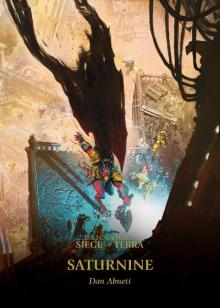 Saturnine
Saturnine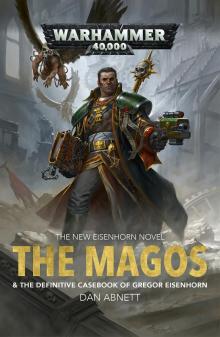 The Magos
The Magos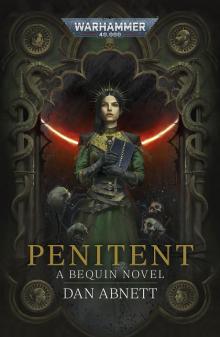 Penitent
Penitent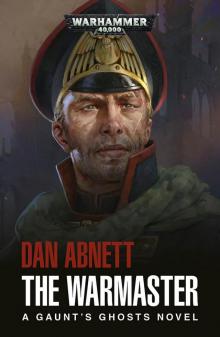 THE WARMASTER
THE WARMASTER Gilead's Blood
Gilead's Blood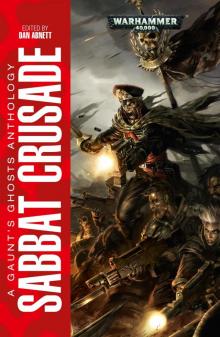 Sabbat Crusade
Sabbat Crusade![[Warhammer 40K] - Double Eagle Read online](http://i1.bookreadfree.com/i/03/16/[warhammer_40k]_-_double_eagle_preview.jpg) [Warhammer 40K] - Double Eagle
[Warhammer 40K] - Double Eagle![[Gaunt's Ghosts 02] - Ghostmaker Read online](http://i1.bookreadfree.com/i/03/16/[gaunts_ghosts_02]_-_ghostmaker_preview.jpg) [Gaunt's Ghosts 02] - Ghostmaker
[Gaunt's Ghosts 02] - Ghostmaker![[Gaunt's Ghosts 10] - The Armour of Contempt Read online](http://i1.bookreadfree.com/i/03/16/[gaunts_ghosts_10]_-_the_armour_of_contempt_preview.jpg) [Gaunt's Ghosts 10] - The Armour of Contempt
[Gaunt's Ghosts 10] - The Armour of Contempt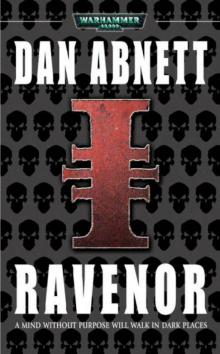 Ravenor
Ravenor Border Princes
Border Princes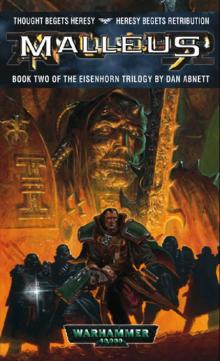 Warhammer - Eisenhorn 02 - Malleus (Abnett, Dan)
Warhammer - Eisenhorn 02 - Malleus (Abnett, Dan)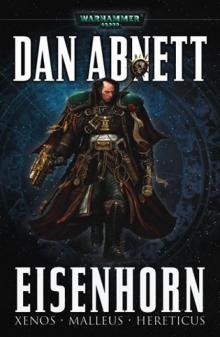 Eisenhorn Omnibus
Eisenhorn Omnibus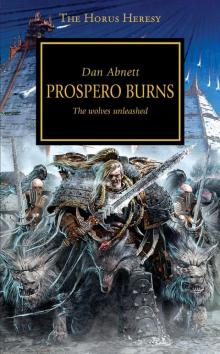 Prospero Burns
Prospero Burns The Story of Martha
The Story of Martha Extinction Event
Extinction Event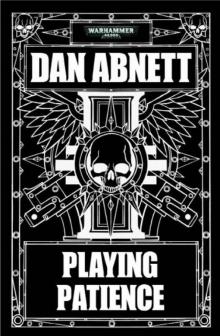 Playing Patience
Playing Patience Lara Croft and the Blade of Gwynnever
Lara Croft and the Blade of Gwynnever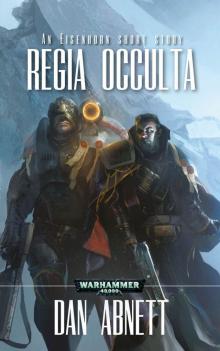 Regia Occulta
Regia Occulta![[Gaunt's Ghosts] - The Iron Star Read online](http://i1.bookreadfree.com/i/03/13/[gaunts_ghosts]_-_the_iron_star_preview.jpg) [Gaunt's Ghosts] - The Iron Star
[Gaunt's Ghosts] - The Iron Star![[Warhammer] - Fell Cargo Read online](http://i1.bookreadfree.com/i/03/13/[warhammer]_-_fell_cargo_preview.jpg) [Warhammer] - Fell Cargo
[Warhammer] - Fell Cargo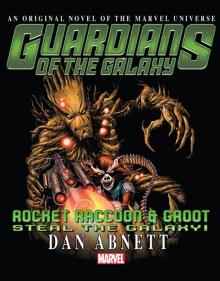 GUARDIANS OF THE GALAXY: ROCKET RACCOON & GROOT STEAL THE GALAXY!
GUARDIANS OF THE GALAXY: ROCKET RACCOON & GROOT STEAL THE GALAXY!![[Ravenor 01] Ravenor - Dan Abnett Read online](http://i1.bookreadfree.com/i/03/20/[ravenor_01]_ravenor_-_dan_abnett_preview.jpg) [Ravenor 01] Ravenor - Dan Abnett
[Ravenor 01] Ravenor - Dan Abnett![[Gaunt's Ghosts 06] - Straight Silver Read online](http://i1.bookreadfree.com/i/03/17/[gaunts_ghosts_06]_-_straight_silver_preview.jpg) [Gaunt's Ghosts 06] - Straight Silver
[Gaunt's Ghosts 06] - Straight Silver![[Ravenor 02] Ravenor Returned - Dan Abnett Read online](http://i1.bookreadfree.com/i/03/20/[ravenor_02]_ravenor_returned_-_dan_abnett_preview.jpg) [Ravenor 02] Ravenor Returned - Dan Abnett
[Ravenor 02] Ravenor Returned - Dan Abnett![[Gaunt's Ghosts 08] - Traitor General Read online](http://i1.bookreadfree.com/i/03/14/[gaunts_ghosts_08]_-_traitor_general_preview.jpg) [Gaunt's Ghosts 08] - Traitor General
[Gaunt's Ghosts 08] - Traitor General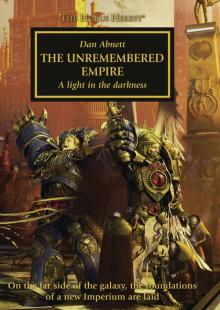 The Unremembered Empire
The Unremembered Empire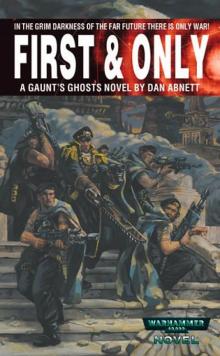 First and Only
First and Only![[Darkblade 05] - Lord of Ruin Read online](http://i1.bookreadfree.com/i/03/15/[darkblade_05]_-_lord_of_ruin_preview.jpg) [Darkblade 05] - Lord of Ruin
[Darkblade 05] - Lord of Ruin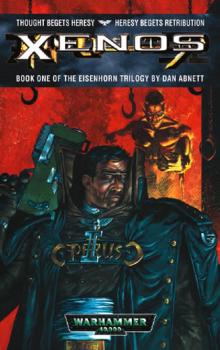 Warhammer - Eisenhorn 01 - Xenos (Abnett, Dan)
Warhammer - Eisenhorn 01 - Xenos (Abnett, Dan) Meduson
Meduson The Fall of Malvolion
The Fall of Malvolion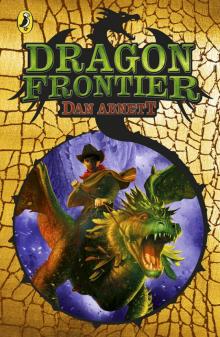 Dragon Frontier
Dragon Frontier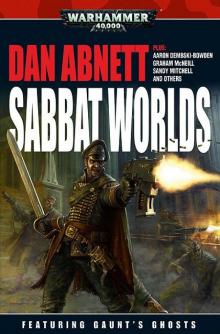 Sabbat Worlds
Sabbat Worlds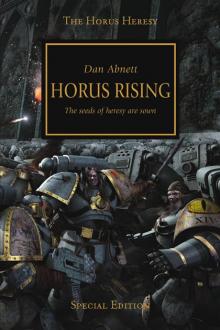 Horus Rising
Horus Rising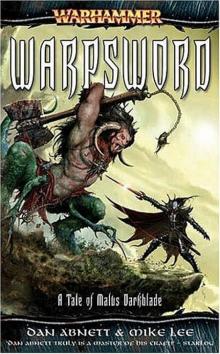 Warhammer - Darkblade 04 - Warpsword
Warhammer - Darkblade 04 - Warpsword Avengers_Everybody Wants to Rule the World_Marvel Comics Prose
Avengers_Everybody Wants to Rule the World_Marvel Comics Prose![[Gaunt's Ghosts 04] - Honour Guard Read online](http://i1.bookreadfree.com/i/03/16/[gaunts_ghosts_04]_-_honour_guard_preview.jpg) [Gaunt's Ghosts 04] - Honour Guard
[Gaunt's Ghosts 04] - Honour Guard![[Darkblade 04] - Warpsword Read online](http://i1.bookreadfree.com/i/03/16/[darkblade_04]_-_warpsword_preview.jpg) [Darkblade 04] - Warpsword
[Darkblade 04] - Warpsword![[Gaunt's Ghosts 11] - Only in Death Read online](http://i1.bookreadfree.com/i/03/16/[gaunts_ghosts_11]_-_only_in_death_preview.jpg) [Gaunt's Ghosts 11] - Only in Death
[Gaunt's Ghosts 11] - Only in Death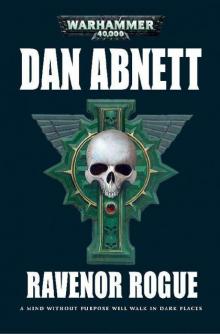 Ravenor Rogue
Ravenor Rogue![[Ravenor 03] Ravenor Rogue - Dan Abnett Read online](http://i1.bookreadfree.com/i/03/16/[ravenor_03]_ravenor_rogue_-_dan_abnett_preview.jpg) [Ravenor 03] Ravenor Rogue - Dan Abnett
[Ravenor 03] Ravenor Rogue - Dan Abnett Double Eagle
Double Eagle Doctor Who - The Silent Stars Go By
Doctor Who - The Silent Stars Go By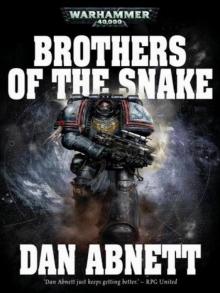 Brothers of the Snake
Brothers of the Snake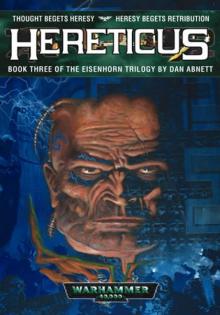 Warhammer - Eisenhorn 03 - Hereticus (Abnett, Dan)
Warhammer - Eisenhorn 03 - Hereticus (Abnett, Dan)![[Darkblade 03] - Reaper of Souls Read online](http://i1.bookreadfree.com/i/03/16/[darkblade_03]_-_reaper_of_souls_preview.jpg) [Darkblade 03] - Reaper of Souls
[Darkblade 03] - Reaper of Souls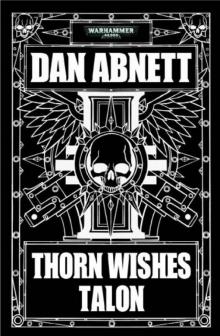 Thorn Wishes Talon
Thorn Wishes Talon Doctor Who
Doctor Who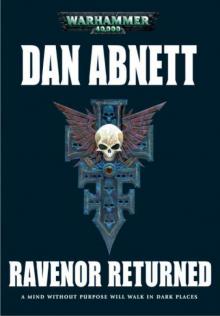 Ravenor Returned
Ravenor Returned Avengers: Everybody Wants to Rule the World
Avengers: Everybody Wants to Rule the World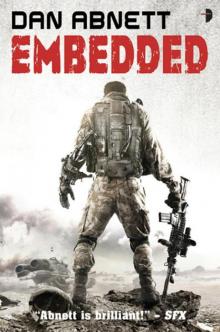 Embedded
Embedded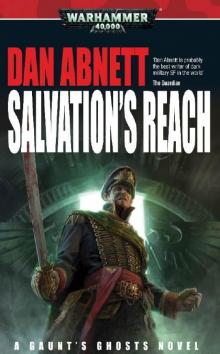 Salvation's Reach
Salvation's Reach![[Gaunt's Ghosts 03] - Necropolis Read online](http://i1.bookreadfree.com/i/03/19/[gaunts_ghosts_03]_-_necropolis_preview.jpg) [Gaunt's Ghosts 03] - Necropolis
[Gaunt's Ghosts 03] - Necropolis![[Darkblade 01] - The Daemon's Curse Read online](http://i1.bookreadfree.com/i/03/17/[darkblade_01]_-_the_daemons_curse_preview.jpg) [Darkblade 01] - The Daemon's Curse
[Darkblade 01] - The Daemon's Curse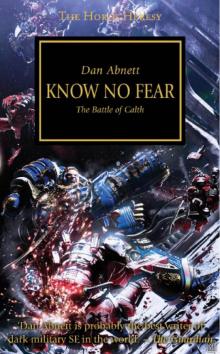 Know No Fear
Know No Fear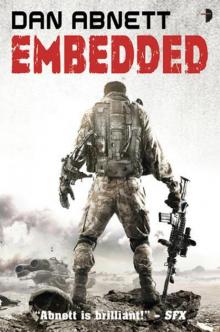 Dan Abnett - Embedded
Dan Abnett - Embedded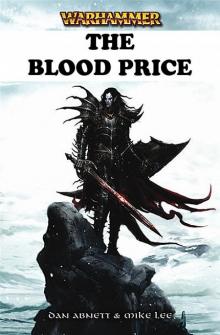 00.1 - The Blood Price
00.1 - The Blood Price![[Warhammer 40K] - Sabbat Worlds Read online](http://i1.bookreadfree.com/i/03/17/[warhammer_40k]_-_sabbat_worlds_preview.jpg) [Warhammer 40K] - Sabbat Worlds
[Warhammer 40K] - Sabbat Worlds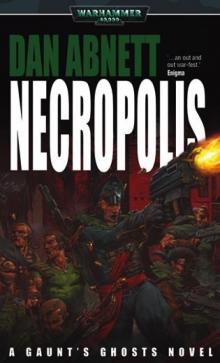 Necropolis
Necropolis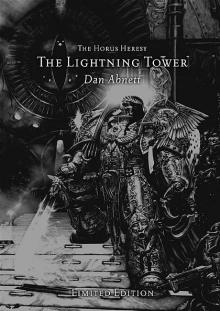 The Lightning Tower & The Dark King
The Lightning Tower & The Dark King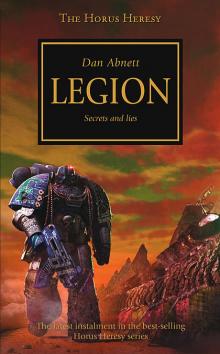 Legion
Legion Tomb Raider: The Ten Thousand Immortals
Tomb Raider: The Ten Thousand Immortals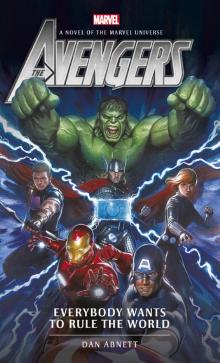 Avengers
Avengers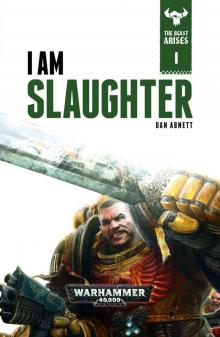 I am Slaughter
I am Slaughter![[Gaunt's Ghosts 07] - Sabbat Martyr Read online](http://i1.bookreadfree.com/i1/04/02/[gaunts_ghosts_07]_-_sabbat_martyr_preview.jpg) [Gaunt's Ghosts 07] - Sabbat Martyr
[Gaunt's Ghosts 07] - Sabbat Martyr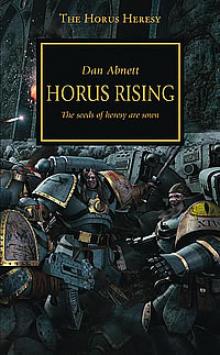 The Horus Heresy: Horus Rising
The Horus Heresy: Horus Rising![[Gaunt's Ghosts 01] - First & Only Read online](http://i1.bookreadfree.com/i1/04/02/[gaunts_ghosts_01]_-_first_&_only_preview.jpg) [Gaunt's Ghosts 01] - First & Only
[Gaunt's Ghosts 01] - First & Only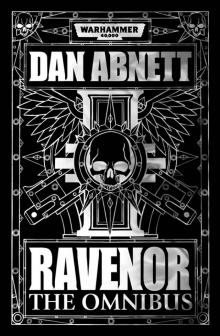 Ravenor Omnibus
Ravenor Omnibus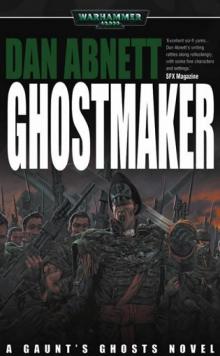 Ghostmaker
Ghostmaker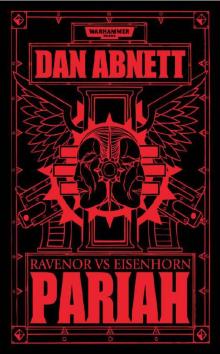 Pariah: Eisenhorn vs Ravenor
Pariah: Eisenhorn vs Ravenor![[Gaunt's Ghosts 12] - Blood Pact Read online](http://i1.bookreadfree.com/i1/04/04/[gaunts_ghosts_12]_-_blood_pact_preview.jpg) [Gaunt's Ghosts 12] - Blood Pact
[Gaunt's Ghosts 12] - Blood Pact![[Gaunt's Ghosts 05] - The Guns of Tanith Read online](http://i1.bookreadfree.com/i1/04/01/[gaunts_ghosts_05]_-_the_guns_of_tanith_preview.jpg) [Gaunt's Ghosts 05] - The Guns of Tanith
[Gaunt's Ghosts 05] - The Guns of Tanith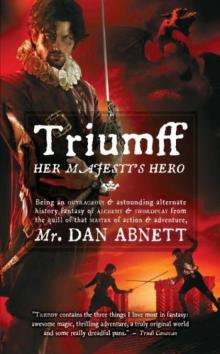 Triumff: Her Majesty's Hero
Triumff: Her Majesty's Hero![[Gaunt's Ghosts 09] - His Last Command Read online](http://i1.bookreadfree.com/i1/04/02/[gaunts_ghosts_09]_-_his_last_command_preview.jpg) [Gaunt's Ghosts 09] - His Last Command
[Gaunt's Ghosts 09] - His Last Command![[Darkblade 00.1] - The Blood Price Read online](http://i1.bookreadfree.com/i2/04/03/[darkblade_00_1]_-_the_blood_price_preview.jpg) [Darkblade 00.1] - The Blood Price
[Darkblade 00.1] - The Blood Price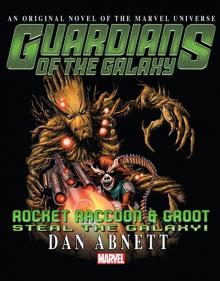 Guardians of the Galaxy: Rocket Raccoon and Groot - Steal the Galaxy!
Guardians of the Galaxy: Rocket Raccoon and Groot - Steal the Galaxy!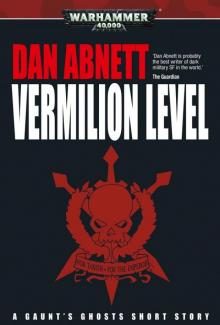 Vermilion Level
Vermilion Level In Remembrance
In Remembrance The Avengers: Everybody Wants to Rule the World
The Avengers: Everybody Wants to Rule the World Border Princes t-2
Border Princes t-2![[Darkblade 02] - Bloodstorm Read online](http://i1.bookreadfree.com/i2/04/07/darkblade_02_-_bloodstorm_preview.jpg) [Darkblade 02] - Bloodstorm
[Darkblade 02] - Bloodstorm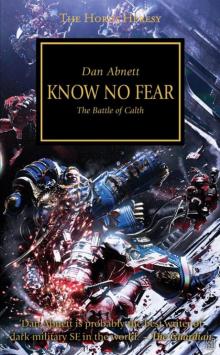 Know no fear. The Battle of Calth hh-19
Know no fear. The Battle of Calth hh-19 The Dark King and The Lightning Tower
The Dark King and The Lightning Tower